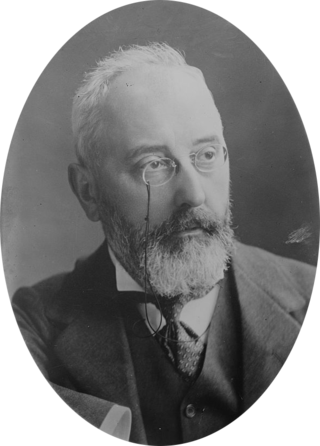
Timothy Michael Healy, KC was an Irish nationalist politician, journalist, author, barrister and a controversial Irish Member of Parliament (MP) in the House of Commons of the United Kingdom of Great Britain and Ireland. His political career began in the 1880s under Charles Stewart Parnell's leadership of the Irish Parliamentary Party (IPP) and continued into the 1920s, when he was appointed as the first governor-general of the Irish Free State.
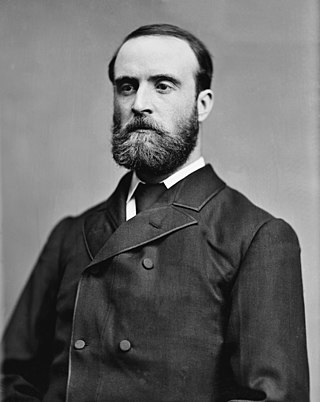
Charles Stewart Parnell was an Irish nationalist politician who served as a Member of Parliament (MP) in the United Kingdom from 1875 to 1891, Leader of the Home Rule League from 1880 to 1882, and then of the Irish Parliamentary Party from 1882 to 1891, who held the balance of power in the House of Commons during the Home Rule debates of 1885–1886. He fell from power following revelations of a long-term affair, and died at age 45.
The Nationalist Party was a term commonly used to describe a number of parliamentary political parties and constituency organisations supportive of Home Rule for Ireland from 1874 to 1922. It was also the name of the main Irish nationalist Nationalist Party in Northern Ireland from 1921 to 1978.
Events from the year 1891 in Ireland.
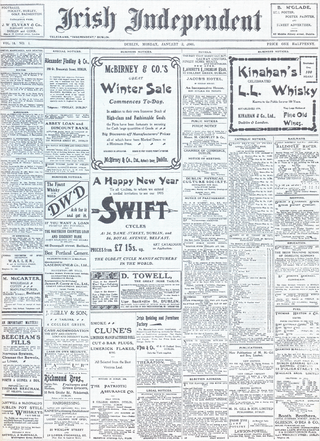
The Daily Irish Independent was an Irish newspaper launched in the 1890s to promote the pro-Parnellite cause following the split in the Irish Parliamentary Party over Parnell's continuing leadership. The party had split following the revelation that Parnell had been involved in a long-running relationship with Katharine O'Shea, the wife of a fellow MP, and was the father of most of her children.

The Kilmainham Treaty was an informal agreement reached in May 1882 between Liberal British prime minister William Ewart Gladstone and the Irish nationalist leader Charles Stewart Parnell. Whilst in gaol, Parnell moved in April 1882 to make a deal with the government, negotiated through Captain William O'Shea MP. The government would settle the "rent arrears" question allowing 100,000 tenants to appeal for fair rent before the land courts. Parnell promised to use his good offices to quell the violence and to co-operate cordially for the future with the Liberal Party in forwarding Liberal principles and measures of general reform. Gladstone released the prisoner and the agreement was a major triumph for Irish nationalism as it won abatement for tenant rent-arrears from the Government at the height of the Land War.

The Irish National Federation (INF) was a nationalist political party in Ireland. It was founded in 1891 by former members of the Irish National League (INL), after a split in the Irish Parliamentary Party (IPP) on the leadership of Charles Stewart Parnell. Parnell had refused to resign his leadership of the party after being named in divorce proceedings against Katharine O'Shea by the former MP William O'Shea. In the aftermath of the divorce, William Ewart Gladstone, leader of the Liberal Party, had declared that he would not work with Parnell, damaging the parliamentary alliance between the IPP and the Liberals.
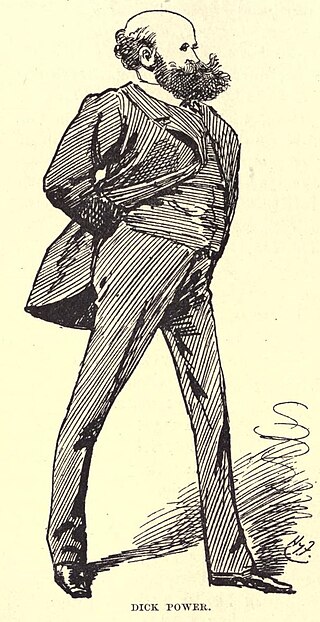
Richard Power was an Irish nationalist politician and MP in the House of Commons of the United Kingdom of Great Britain and Ireland and as member of the Home Rule League and the Irish Parliamentary Party represented Waterford City from 6 February 1874 until his death at the early age of 40, in 1891.
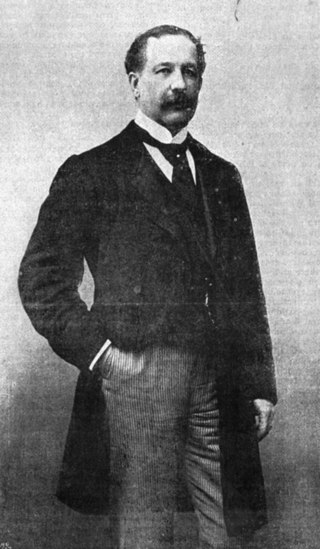
Captain William Henry O'Shea was an Irish soldier and Member of Parliament. He is best known for being the ex-husband of Katharine O'Shea, the long-time mistress of the Irish nationalist leader Charles Stewart Parnell.
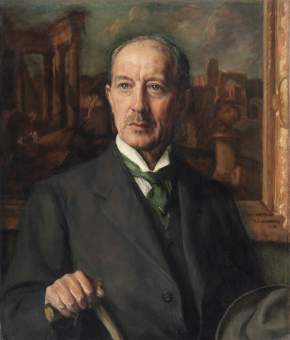
Captain Henry Harrison was an Irish politician. He served as MP in the House of Commons of the United Kingdom of Great Britain and Ireland and as member of the Irish Parliamentary Party represented Mid Tipperary from 1890 to 1892. He later served as a Royal Irish Regiment officer with the New British Army in World War I, was an extensive writer, and proponent of improved relations between the United Kingdom and Ireland.
Sir Henry Campbell was an Irish nationalist politician. He was Member of Parliament (MP) for South Fermanagh from 1885 to 1892, private secretary to the Irish leader Charles Stewart Parnell from 1880 to 1891, and Town Clerk of Dublin from 1893 to 1920.
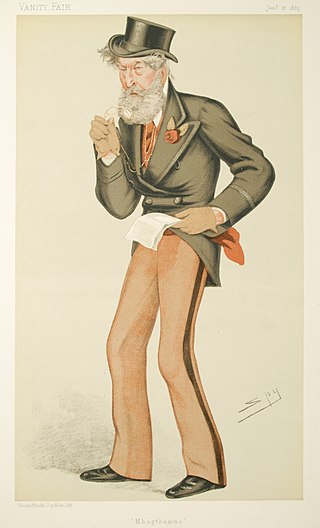
Charles James Patrick Mahon, known as the O'Gorman Mahon or James Patrick Mahon, was an Irish nationalist journalist, barrister, parliamentarian and international mercenary.

Parnell is a 1937 American biographical film produced by Metro-Goldwyn-Mayer, starring Clark Gable as Charles Stewart Parnell, the famous Irish politician. It was Gable's least successful film and is generally considered his worst, and it is listed in The Fifty Worst Films of All Time. The movie addresses the adulterous relationship that destroyed Parnell's political career, but its treatment of the subject is highly sanitized in keeping with Hollywood content restrictions at the time.

Sir Matthew Wood, 1st Baronet was a British Whig politician, Lord Mayor of London from 1815 to 1817, and from 1817 until his death in 1843 a reformist Member of Parliament.
Western Wood was a British businessman and a Liberal Party politician. He sat in the House of Commons from 1861 to 1863.
The 1891 County Carlow by-election was a parliamentary by-election held for the United Kingdom House of Commons constituency of County Carlow on 7 July 1891. It arose as a result of the death of the sitting member, James Patrick Mahon.
Parnell and the Englishwoman is a British television miniseries which aired on BBC Two in four hour-long episodes from 9 to 30 January 1991, and RTÉ One from 10 to 31 January 1991. The story is based on an episode in the life of Irish politician Charles Stewart Parnell and is based on Hugh Leonard's historical novel of the same name. The series was also shown on Masterpiece Theatre in the United States.
Benjamin Wood was a British Whig politician. He was Member of Parliament for Southwark from 24 January 1840 until his death in 1845
Lady Emma Caroline Wood was a British novelist and artist. She wrote more than a dozen novels, at least one under the pen name C. Sylvester.

The Rev. Sir John Page Wood, 2nd Baronet (1796–1866) was an English cleric, magistrate and radical Whig, closely associated with the return in 1820 to the United Kingdom of Queen Caroline of Brunswick, and her private secretary at that period.












